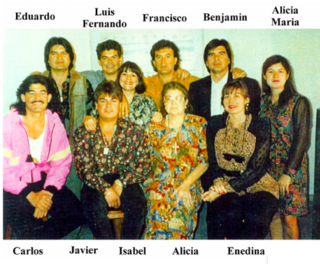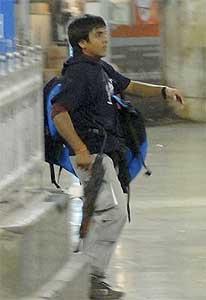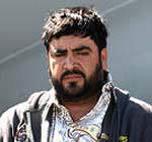
The Mumbai Police is the police department of the city of Mumbai, Maharashtra. It is a part of Maharashtra Police and has the primary responsibilities of law enforcement and investigation within the limits of Mumbai. The force's motto is "Sadrakṣaṇāya Khalanigrahaṇāya".
The 1993 Bombay bombings were a series of 12 terrorist bombings that took place in Bombay, Maharashtra, on 12 March 1993. The single-day attacks resulted in 257 fatalities and 1,400 injuries. The attacks were coordinated by Dawood Ibrahim, leader of the Mumbai-based international organised crime syndicate D-Company. Ibrahim was believed to have ordered and helped organize the bombings through his subordinates Tiger Memon and Yakub Memon.

Sanjay Balraj Dutt is an Indian actor who works in Hindi cinema in addition to a few Kannada, Tamil, Punjabi and Telugu films. In a career spanning over four decades, Dutt has won several accolades and acted in over 135 films, ranging from romance to comedy genres, though usually in action genres, thus proving himself one of the most popular Hindi film actors since the 1980s.
Dance bar is a term used in India to refer to bars in which adult entertainment in the form of dances by relatively well-covered women are performed for male patrons in exchange for cash. Dance bars used to be present only in Maharashtra, but later spread across the country, mainly in cities. Dance bars are a flirtatious world of fantasy catering to the need of feeling of being wanted.
Robert Dale Rowell was a murderer executed by lethal injection by the U.S. state of Texas. He was convicted of the May 10, 1993, murder of Raymond Davey Mata in a Houston, Texas crack house.
Salil Ashok Ankola is a former international cricketer who played one Test match and 20 One Day Internationals (ODIs) from 1989 to 1997 for India. A right-arm fast-medium bowler, he played first-class cricket for Mumbai, regularly opening the bowling. Ankola's consistency for Mumbai team earned him a spot for representing India during their tour of Pakistan in 1989–90. After the first Test match at Karachi, he was dropped for the subsequent matches in the series owing to injuries. After a brief phase of playing first-class cricket, Ankola was called for the Indian ODI team during 1993, eventually led to being a part of the 1996 Cricket World Cup. His reputation as a poor fielder, resulted in being dropped from the side after subsequent series. At 28, Ankola retired from international cricket to pursue acting. Since then he went on to appear in a number of Indian soap operas and a few Bollywood movies. In 2020, he was selected as the chief selector of the Mumbai Cricket Association.
The legal status of cocaine varies worldwide. Even though many countries have banned the sale of cocaine for recreational use, some have legalized it for possession, personal use, transportation, and cultivation, while some have decriminalized it for certain uses. It is necessary to distinguish cocaine from coca leaves or the plant itself.

Eduardo Arellano Félix is a Mexican drug trafficker, brother of Benjamín, Ramón, Javier and sister, Enedina, all drug traffickers. The Arellano-Félix Organization, also known as the Tijuana Cartel, has been responsible for numerous murders and the smuggling of thousands of tons of marijuana, cocaine, heroin and methamphetamine for more than a decade. The DEA believes that the Arellano-Félix brothers were responsible for the numerous smuggling tunnels that were found in January 2006.
Moral police is an umbrella category of vigilante groups which act to enforce a code of morality in India. Some of India's laws, and some actions of police forces in India are also considered to be instances of moral policing. The target of moral policing is any activity that vigilante groups, the government or police deem to be "immoral" and/or "against Indian culture".
The 25 August 2003 Mumbai bombings were twin car bombings in the Indian city of Mumbai that killed 54, and injured 244 people. One of the bomb explosions took place at the Gateway of India, which is a major tourist attraction. The other bomb went off in a jewellery market Zaveri Bazaar near the Mumba Devi temple in central Mumbai. Both the bombs were planted in parked taxis and exploded during the lunch hour. No group initially claimed responsibility for the attack, but Pakistan-based Lashkar-e-Toiba was blamed for it.
Maryland v. Pringle, 540 U.S. 366 (2003), was a decision by the Supreme Court of the United States in which the Court unanimously upheld the arrest of three passengers in an automobile where drugs were found. The case regards the reasonableness of the arrest of a passenger in an automobile.

The Prevention of Corruption Act, 1988 is an Act of the Parliament of India enacted to combat corruption in government agencies and public sector businesses in India.

The 2008 Mumbai attacks were a series of terrorist attacks that took place in November 2008, when 10 members of Lashkar-e-Taiba, a militant Islamist organisation from Pakistan, carried out 12 coordinated shooting and bombing attacks lasting four days across Mumbai. The attacks, which drew widespread global condemnation, began on Wednesday 26 November and lasted until Saturday 29 November 2008. A total of 175 people died, including nine of the attackers, with more than 300 injured.

Mohammed Ajmal Amir Kasab was a Pakistani terrorist and a member of the Islamic terrorist organization Lashkar-e-Taiba through which he took part in the 2008 Mumbai terrorist attacks in Maharashtra, India. Kasab, alongside fellow Lashkar-e-Taiba recruit Ismail Khan, killed 72 people during the attacks, most of them at the Chhatrapati Shivaji Terminus. Kasab was the only attacker captured alive by police.

The National Investigation Agency (NIA) is a specialized counter-terrorism law enforcement agency in India. The agency is empowered to deal with the investigation of terror related crimes across states without special permission from the states under written proclamation from the Ministry of Home Affairs. The primary mandate of the National Investigation Agency is to investigate and prosecute offenses that have national and cross-border implications, specifically focusing on terrorism, insurgency, and other related matters. It is empowered to investigate cases that involve threats to the sovereignty, security, and integrity of India. It has the authority to conduct searches, seizures, and arrests, as well as to collect evidence and maintain a database of terrorist organizations and their members.
A drug lord, drug baron, kingpin, lord of drugs, or narcotrafficker is a type of crime boss, who is in charge of a drug-trafficking network, organization, or enterprise.

The Directorate of Enforcement (ED) is a domestic law enforcement agency and economic intelligence agency responsible for enforcing economic laws and fighting economic crime in India. It is part of the Department of Revenue, Ministry of Finance, Government Of India. The Enforcement Directorate focuses on investigating and prosecuting cases related to money laundering, foreign exchange violations, and economic offenses. Its primary objective is to curb the generation and circulation of black money and to ensure compliance with the laws concerning foreign exchange and prevention of money laundering. However, targets of the enforcement directorate have claimed that the they misuse powers against activists, scholars, and political rivals.

Alfredo Beltrán Leyva, commonly referred to by his alias El Mochomo, is a Mexican convicted drug lord and former leader of the Beltrán-Leyva Cartel, a drug trafficking organization. He was one of Mexico's most-wanted drug lords. Beltrán Leyva was responsible for smuggling multi-ton shipments of cocaine and methamphetamine to the United States from Mexico and South America between the 1990s and 2000s. He worked alongside his brothers Héctor, Carlos, and Arturo.

The Fair Sentencing Act of 2010 was an Act of Congress that was signed into federal law by United States President Barack Obama on August 3, 2010, that reduces the disparity between the amount of crack cocaine and powder cocaine needed to trigger certain federal criminal penalties from a 100:1 weight ratio to an 18:1 weight ratio and eliminated the five-year mandatory minimum sentence for simple possession of crack cocaine, among other provisions. Similar bills were introduced in several U.S. Congresses before its passage in 2010, and courts had also acted to reduce the sentencing disparity prior to the bill's passage.

The 2013 Mumbai gang rape, also known as the Shakti Mills gang rape, refers to the incident in which a 22-year-old photojournalist, who was interning with an English-language magazine in Mumbai, was gang-raped by five people including a juvenile. The incident occurred on 22 August 2013, when she had gone to the deserted Shakti Mills compound, near Mahalaxmi in South Mumbai, with a male colleague on an assignment. The accused had tied up the victim's colleague with belts and raped her. The accused took photos of the victim during the sexual assault, and threatened to release them to social networks if she reported the rape. Later, an eighteen-year-old call centre employee reported that she too had been gang-raped, on 31 July 2013 inside the mills complex.










